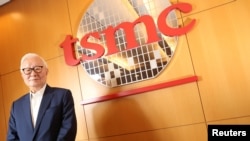Plans by the world's largest contract chipmaker for a record $100 billion capacity expansion will just mildly dent a growing worldwide shortage of semiconductors for gear such as high-speed notebook computers, 5G smartphones and newer vehicles, tech experts believe.
Taiwan Semiconductor Manufacturing Co. said in an April 1 legal notice to the Taipei stock exchange that it would use the money over three years on “leading technology” for manufacturing and R&D to “answer demands from the market.” The notice specifically cites demand for chips used in 5G-enabled and high-performance devices.
That amount would set a dollar-value record for the company, which is better known as TSMC, said Brady Wang, an analyst in Taipei with the market intelligence firm Counterpoint Research.
TSMC’s investment will ease “anxiety” among clients worried about semiconductor supply-chain instability caused in part by Sino-U.S. trade tension, said Kent Chong, managing director of professional services firm PwC Legal in Taipei. Its clients include multiple American hardware developers including Apple.
“Overall, it would indeed increase capacity, without any question,” Chong said. American clients hope to source chips in the United States, he added. The company headquartered southwest of Taipei is already planning to open a $12 billion plant in the U.S. state of Arizona. “TSMC is obviously the forefront runner in bringing the whole supply chain to the U.S.,” Chong said.
TSMC said in its stock market filing it is “working closely with our customers to address their needs in a sustainable manner.”
Years-long shortage
Analysts caution, though, that the ever-growing demand for chips paired with the lag time in building new production plants will extend the shortage for years, despite TSMC’s investment.
“You can throw a lot of money at it, but it’s not going to solve the problem,” said Sean Su, an independent political and technology consultant in Taipei.
He pointed to popularity of home-use devices during the pandemic and a possible long-term reliance on this technology in “hybrid” online-offline economy after COVID-19 subsides.
“Demand is off the ceiling,” Su said. “People want smartphones. People want this and that more than ever. People want tablets all of a sudden. Every single child in the house now needs a computer instead of sharing it.”
Remote study and telework, two trends that emerged during the 2020 coronavirus outbreak, particularly raised demand last year for chips that run high-speed notebook PCs. That trend is piggybacking on prepandemic demand for 5G smartphones and new devices that run on artificial intelligence.
Automakers joined the mix, too, last year as they placed orders for automated vehicles and electric cars. Because of the current chip shortage, they must wait until at least early 2022 as production capacity is now “fully loaded,” said Wen Liu, industry analyst with the Taipei-based Market Intelligence & Consulting Institute.
Feeling an additional pinch
World demand for chips should increase from $450 billion last year to about $600 billion in 2024, market research firm Gartner says. Industry revenue had already grown 5.4% from 2019 to 2020, according to fellow market research company IDC. TSMC and South Korean technology giant Samsung are the biggest chipmakers today and make the highest-grade chips.
Chinese semiconductor clients will feel an additional pinch because of curbs introduced by former U.S. President Donald Trump’s administration, Su said. The Trump administration barred companies, including those based offshore, from working with a list of Chinese firms considered national security risks.
“They will be [affected in China] due to trade embargoes as is,” Su said. “Every year, companies fight over limited batches of top-end processors.”
China-based chip buyers include developers of three of the world’s five biggest smartphone brands by market share in late 2020.
Most of the world’s chipmakers, such as the growing China-based Semiconductor Manufacturing International Corp., lag in the equipment and knowhow to make chips that run fast on low power, tech analysts believe. TSMC’s investment will help it stay ahead of any up-and-coming peers, Wang said.
“This is actually because [TSMC] saw a new opportunity, which would mainly be in 5G or high-performance PCs or demands for other digitization needs as that’s the demand following COVID-19,” Wang said. TSMC itself probably does not expect the planned $100 billion outlay to ease today’s chip shortage, he said.
The company says in its stock exchange notice that “multiyear mega-trends...are expected to fuel strong demand for our semiconductor technologies in the next several years,” while the pandemic “accelerates digitalization in every aspect.”









